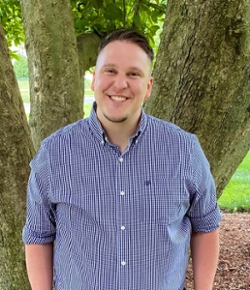
WesWell, the Office of Health Education, has hired Patrick Gordon as its new director, replacing previous director Seirra Fowler. Fowler left the position in January 2021. The selection committee for the position was comprised of University faculty and undergraduate students, including Peer Health Advocates (PHAs) and WesWell staff.
WesWell Bystander Intervention Intern Molly Hunsinger ’23 was one of the students on the selection committee and spoke to Gordon’s credentials.
“[Gordon] has a lot of public health experience and background,” Hunsinger said. “He also has experience working on a liberal arts campus. He does a great job at understanding nuances in terms of health and wellness having to do with intersectionality. [Gordon] always makes sure to consider the context when talking about aspects of health and wellness.”
WesWell is responsible for doing outreach and creating workshops to support a community of wellness and promote education on various health topics including body image, sleep, sexual assault, and more.
“Our role is really to figure out how [to] be in tune with student wellbeing needs,” Gordon said. “How do we find ways to talk with students that shift the norms on campus that maybe reduce stigma.”
As the Director of WesWell, Gordon focuses on figuring out what current student well-being needs are by opening lines of communication within student groups and communities.
“One of the unique roles that I think a director especially focuses on is how do we understand…the story of what is happening on campus right now with wellbeing?” Gordon said. “How do we bring all voices to the table? How do we gather data around that? And then how do we strategize to really meet those needs?”
Gordon’s primary goals at the moment include supporting the transition of students back to campus, making sure that students are aware of and connected to resources, and reducing the stigma associated with seeking help.
“One of the main goals is how to build partnerships across campus,” Gordon said. “Well-being and how we work on our well-being…can’t be something that is just [done] when we have the free time to do it. We have to be able to make systems of well-being and systems that support our well-being a part of the experience.”
Gordon hopes to build community by updating and increasing the number of workshops on topics like sexual health, alcohol and other drug use, stress management, mindfulness, and more. These programs are usually requested by Resident Advisors (RAs) and athletic teams but can be requested by any student or student group on campus. WesWell runs several programs such as Bartending School, Weeding out the Facts, and We Speak We Stand. If students are interested in hosting a program on a topic that is not currently offered they can request new programs and WesWell will develop a workshop and presentation on the subject.
If a student has an individual inquiry, they can either make an appointment for a consult or simply walk into Gordon’s office or that of Alcohol and Other Drug Specialist September Johnson. WesWell has an open-door policy.
“Pat[trick Gordon] and I are trained health educators and so with that a lot of kind of awkward or stigmatized subjects often come up,” Johnson said. “You can ask me any question you want and it’s not going to faze me and we’re going to have a great discussion surrounding it.”
Johnson added that she is always willing to collaborate with students who need help from the WesWell Office or have questions of any nature.
“I’m going to want to help you find the best information that’s out there,” Johnson said.“We’re going to be really happy that you came to us and trusted us to ask that question.”
If a student doesn’t want to talk with a member of the WesWell team, the office also offers a wealth of resources in their Resource Room, located immediately to the left of the entrance to the WesWell office. The Resource Room contains condoms, menstrual products, lube, dental dams, stickers, phone card holders, cold and flu packs, information pamphlets, and a library of health and wellness books. Gordon hopes to add more to the Resource Room and update what is there as well, including replacing the information packets with QR codes and posters.
Gordon also said he hopes that students who aren’t struggling and just want to improve their general health and well-being will still use WesWell as a resource.
“You don’t have to seek support only when you feel like you are struggling,” Gordon said. “We just want to be able to support people on their wellness journeys and meet them where they are.”
Kat Struhar can be reached at kstruhar@wesleyan.edu.


Leave a Reply